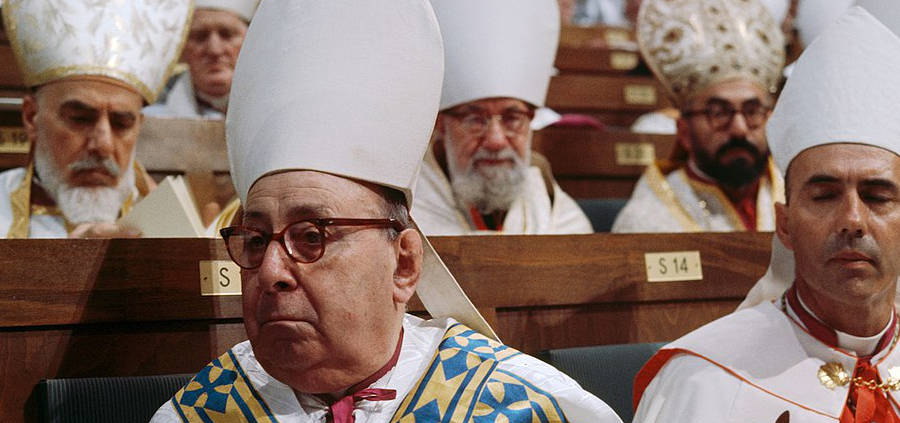Absent from the Pew by Julie A. Ferraro

A big part of my job as a communicator is keeping track of what’s happening locally, nationally, globally. That means checking news from a wide variety of sources, some of which can be frustrating or disturbing in the narrow focus of the reporting.
Sometimes, that narrowness applies to campaigns regarding the church. For instance, the “Eucharistic Revival” launched by the United States Conference of Catholic Bishops, in anticipation of a National Eucharistic Congress to be held July 17–21, 2024, in Indianapolis, Indiana.
Now, I’m not going to say the Eucharist isn’t important for Catholics, especially after Covid-19 forced churches to close and people had to watch the Mass via Facebook or other streaming services, unable to receive the Eucharist in physical form. What I will say is that the bishops are deflecting into this “revival” energies and money that could—and should—be used to repair the damage done by their willful failure to deal with current crises.
Case in point: Archbishop Joseph F. Naumann of the Archdiocese of Kansas City in Kansas. He publicly supported San Francisco Archbishop Salvatore Cordileone’s mandate that House Speaker Nancy Pelosi be denied Holy Communion in all churches within that California archdiocese. His lack of effort to meaningfully involve people throughout the Kansas City archdiocese in the synodal process has disenfranchised many.
Then, Naumann had the audacity to make this statement, as included in an article from the archdiocesan newspaper The Leaven: “The bishops are concerned about the decline of Mass attendance in the United States as well as some studies that indicate that many Catholics do not believe in the real presence of Jesus in the Eucharist.”
He just doesn’t “get it,” as they say. Many of his brother bishops are equally dismissive of the fact that people aren’t attending Mass because of the attitudes so many bishops and priests when it comes to matters such as the clergy abuse scandal—and I don’t quantify the abuse as merely “sexual,” because there are many priests who psychologically, emotionally, or verbally abuse laypeople of all ages, and denigrate entire cultures, who are never even reprimanded for their failure to abide by Jesus’s own statement, “Love one another as I have loved you.”
Too many American bishops, like horses, are wearing blinders, seeing only what they wish to see. A letter dated June 6 from bishops in Colorado—Denver, Pueblo, and Colorado Springs—judges politicians who voted in favor of a recent abortion bill as “outside of the communion of the Church,” and advises them to “publicly repent” and requests they do not receive the Eucharist, the Religion News Service reports.
Where is the bishops’ concern for those living in abject poverty, unable to adequately care for their families because the federal minimum wage hasn’t been raised since 2009? Why aren’t they leading marches, or planning forums to encourage lawmakers to enact legislation that reflects Catholic social justice teaching?
The reason people are fleeing the pews is because they can’t tolerate the vitriol spewed from the mouths of ordained men criticizing the laity for not being “holy enough.” The backward trend of seminary training, churning out priests who believe they should be placed on pedestals and obeyed to the letter, is decimating the faithful.
Perhaps no example of this is more poignant than when a newly assigned associate pastor presided at his first Mass for a community of Sisters, at which I also happened to be present. Rather than realizing the women in the seats were all older than he, far more experienced in living Christian lives and serving others, he proceeded to lecture them like a third-grade class during his homily.
The pastor was promptly contacted, asking that this young man not return to the convent. The same priest publicly chastised an older couple after Sunday Mass at the parish because he didn’t agree with their personal expression of faith.
It is very off-putting when a bishop—as I’ve personally seen Naumann do—parades around in his mitre, stole, and cope during ceremonies where he’s doing little more than offering a closing blessing. During liturgy, sure. But Pope Francis recommended his bishops and priests mingle with the people in a grounded way, being shepherds who “smell of the sheep.”
Until the bishops and priests gain an understanding of how the laity lives, their daily struggles, and stop diverting attention away from their own shortcomings and the need to bolster their own tarnished image, people will continue to migrate away from the church.
Those in ministry must have a wholeness within themselves—body, mind, soul—that does not require the adulation of the public or special garments to garner attention. During an awards ceremony this past spring, upon hearing a young Sister from an order that wears habits denounce those women’s religious communities that minister among the people in lay garb, I shuddered. She claimed only those in habits were “recognizable” as God’s servants.
Clothes do not make the Christian. While some people may gravitate to men or women in habits as “authorities” on matters of faith, or capable of offering meaningful prayers, we must all keep our eyes and ears open, in order not to miss some generous act or tidbit of wisdom that could transform our spiritual journey.
The bishops need to learn that the Eucharist is not only housed in the tabernacles of the church buildings, it abides in every human being on this planet. We are all Christ; there is no scale of “worthiness” based on ordination, wealth, race, culture, political affiliation. And there’s no need for a multimillion-dollar congress to feed their own egos.
Part of a Facebook post I recently noticed—“May the Lord shield all who take refuge in him”—smacks of the exclusion some Catholics like to practice. It should read, “May the Lord shield all.” If the bishops and priests could come around to that viewpoint, maybe the people would come around to Mass. ♦
Julie A. Ferraro has been a journalist for over 30 years, covering diverse beats for secular newspapers as well as writing for many Catholic publications. A mother and grandmother, she currently lives in Atchison, Kansas. Her column, “God ‘n Life,” appears regularly in Today’s American Catholic.





Leave a Reply
Want to join the discussion?Feel free to contribute!